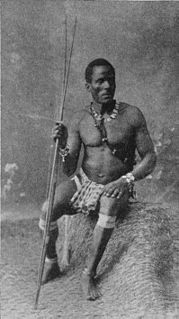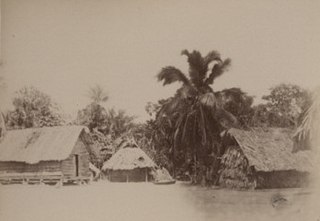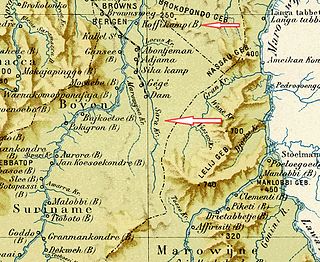
The Saramaka, Saamaka or Saramacca are one of six Maroon peoples in the Republic of Suriname and one of the Maroon peoples in French Guiana. In 2007, the Saramaka won a ruling by the Inter-American Court for Human Rights supporting their land rights in Suriname for lands they have historically occupied, over national government claims. It was a landmark decision for indigenous peoples in the world. They have received compensation for damages and control this fund for their own development goals.
Saramaccan is a creole language spoken by about 58,000 ethnic African people near the Saramacca and the upper Suriname River, as well as in Paramaribo, capital of Suriname. The language also has 25,000 speakers in French Guiana and 8,000 in the Netherlands. It has three main dialects. The speakers are mostly descendants of fugitive slaves who were native to West and Central Africa; they form a group called Saamacca, also spelled Saramaka.
The Kwinti are a Maroon people, descendants of runaway African slaves, living in the forested interior of Suriname on the bank of the Coppename River, and the eponymous term for their language, which has fewer than 300 speakers. Their language is an English-based creole with Dutch, Portuguese and other influences. It is similar to the languages spoken by the Aluku and Paramaccan Maroons, and split from Sranan Tongo in the middle 18th century. The Kwinti had a population of about 300 in 2014 and adhere to the Moravian Church.

Kwakoegron is a town and resort in Suriname. It is located inland, due south of Paramaribo. According to the 2012 census it has a population of 263, and is mainly inhabited by Maroons, of the Matawai people. The resort and town are named after Kwakoe, the native word for Wednesday, and grond, the Dutch word for ground. The captain of the resort resides in the village Commisariskondre.
Abenaston is a village in Suriname with a population of about 700 people in 2005. The population consists of Saramaka Maroons.

Pokigron is a town in Suriname located on Brokopondo Reservoir. It is located in the Boven Suriname municipality (resort) in the Sipaliwini District. It has a population of approximately 400 people in 2018. Pokigron is located at the end of a paved road via Brownsweg to the Afobakaweg. Pokigron is often referred to as Atjoni which is the nearby quay, and literally the end of the road. Villages to the South of Pokigron have to be accessed by boat. The village is home to Maroons of the Saramaka tribe.

Nieuw Jacobkondre is a town in the Sipaliwini District of Suriname. It is situated on the Saramacca River. The village is inhabited by Matawai people.

Warnakomoponafaja is a village in Boven Saramacca municipality (resort) in Sipaliwini District in Suriname.
Tabrikiekondre is a village in Boven Saramacca municipality (resort) in Sipaliwini District in Suriname.
Moetoetoetabriki is a village in Boven Saramacca resort in Sipaliwini District in Suriname. The village is inhabited by Matawai people.
Kwattahede is a village in Boven Saramacca resort in Sipaliwini District in Suriname. The village is inhabited by Matawai people.
Pakka-Pakka or Pakkapakka, also Pakkapakka 1 and Pakkapakka 2, is a Maroon village in the rainforest of Boven Saramacca resort in Sipaliwini District in Suriname. The village is inhabited by Matawai people. The village was founded in the 1860s and was originally home to both Matawai and Kwinti people.
Heidoti is a village in Boven Saramacca municipality (resort) in Sipaliwini District in Suriname. Heidoti is home to Maroons of the Kwinti tribe.

Boven Saramacca is a resort in Suriname, located in the Sipaliwini District. Its population at the 2012 census was 1,427. The dominant geographical feature of this resort is the Saramacca River. The resort is mainly inhabited by Maroons of the Matawai tribe.
Poesoegroenoe or Pusugrunu or Psugrunu is a Matawai village in Boven Saramacca, Sipaliwini District, central Suriname. The village lies along the Saramacca River and is the residence of the gaanman of the Matawai maroons.
Kwinti is an English-based creole of Suriname closely related to Ndyuka. The language has less than 300 speakers, and split from Plantation Creole which is nowadays known as Sranan Tongo in the middle 18th century. Code-switching with Sranan Tongo and Dutch was common among the younger generation in 1973, and about 70% of the tribe have moved to the urban areas. UNESCO considers the language endangered.

Granman is the title of the paramount chief of a Maroon nation in Suriname and French Guiana. The Ndyuka, Saramaka, Matawai, Aluku, Paramaka and Kwinti nations all have a granman. The paramount chiefs of Amerindian peoples in Suriname are nowadays also often called granman.

The Matawai are a tribe of Surinamese Maroons. The Matawai were originally part of the Saramaka, and signed a peace agreement with the Dutch colonists in 1762. The tribe split from the Saramaka, and in 1769, they were recognized as a separate tribe.
Boslanti is a village of Matawai Maroons in the resort of Boven Saramacca in the Sipaliwini District of Suriname. Boslanti is located on the Saramacca River.
Villa Brazil is a garimpeiros village in the Boven Saramacca resort of the Sipaliwini District of Suriname.







